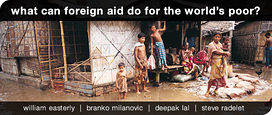I thank my colleagues for providing thoughtful and spirited comments.
The most spirited part of the debate is provided by Dr. Radelet. I hardly need to argue with Dr. Radelet, as he spends most of the time arguing with himself. Aid amounts to virtually nothing, yet accomplishes miracles of raising growth and saving lives. Aid is doing just fine, but needs to be drastically reformed anyway. Aid should not go to middle income countries, except he celebrates middle income “aid success stories” like Korea and Botswana. We should judge on the basis of econometric evidence on average results, except for when he can selectively use data points to support his case. Facts should be used instead of rhetoric, except when he feels the need for ad hominem attacks. We should suppress the debate on aid for the sake of the cause, except for presenting his side of the debate. I should not use unpublished studies, except for Radelet’s own unpublished study. Scientific methods should be used to judge aid’s effects on growth, except for searching across every possible statistical specification until you get the “right” result (which promptly falls apart when other researchers try to replicate it.) Aid does have positive effects on growth, yet aid donors have mysteriously overlooked this positive potential and allowed Africa to stagnate for decades. Aid does have positive effects on growth, except in Radelet’s own “diminishing returns” study in which the most aid-intensive countries have a zero or even negative effect of additional aid on growth.
Dr. Milanovic and Professor Lal both are alarmed at the prospect of a technocratic mega-bureaucracy for evaluation. I said nothing to advocate such a frightening prospect. Actually, evalution lends itself to being one of the least bureaucratic and least centralized activities imaginable. A decentralized array of evaluators who pass minimum tests for methods and independence, many of whom could provide the evaluations on their own initiative, can provide an independent reality check on aid. Nor does it have to be technocratic. While some evaluations could be done rigorously with sophisticated methods, there is also a big role for more informal mechanisms to give voice to the poor on whether aid is reaching them.
Dr. Milanovic, like Dr. Radelet, also worries that debate about aid will be used to set back the cause. I think the absence of debate and the resulting lack of learning from the past on how aid can be more effective is the greater danger. Why are we fine with fierce debates on how best to benefit rich people in rich societies, but don’t want the poor to get the benefits of debate (including hearing from the poor themselves) on how they can be better off?
Professor Lal agrees with the book’s portrayal of the problems, but thinks no aid fix is possible. I am more optimistic: if you have a supply of rich people wanting to help the poor, and a demand for help on the part of the poor, why it is so impossible to bring the two together?

